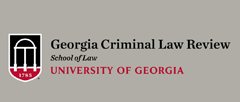Georgia Criminal Law Review
Document Type
Notes
Abstract
Shinn v. Ramirez is the latest in a line of court decisions that place debilitating restrictions on the habeas corpus process, making it more difficult than ever for ineffective assistance of counsel claimants to prevail on a federal habeas claim. Paired with the growing restrictions placed on the criminal appellate process, both by the states and by the Supreme Court, these decisions make it near-impossible for many criminal defendants to challenge their convictions and guarantee their rights.
The decision not to guarantee counsel at the state habeas level is grounded in logic that predated these restrictions. The state habeas hearing has become, for many defendants, the first opportunity to challenge their convictions. For some, it may even be the only opportunity. Due to the increased importance of the state habeas petition itself and the opportunity for evidentiary development at this stage, it is high time to reconsider this decision.
Without a right to counsel at the state habeas proceeding, defendants harmed by ineffective assistance of counsel at prior hearings will face the habeas corpus process without the necessary assistance to make an adequate claim. Without guaranteed counsel, defendants are often forced to represent themselves, leading to faulty evidentiary records. Due to the decision in Shinn, these mistakes cannot be corrected at the federal habeas stage. Therefore, in order for indigent defendants to prevail on their ineffective assistance claims at the federal habeas level, counsel must be provided.
The right to counsel stems from the idea that indigent defendants will be left without the same quality of defense afforded to wealthy ones. Like the criminal trial and appellate stage, the state habeas hearing has taken on a level of critical importance: it is the last opportunity to develop the evidentiary record used to support a particular claim. In a system where many petitioners, either through counsel’s error or due to state procedural rules, will not be given an opportunity to bring their appeal, the state habeas claim may be the only chance they have to develop this claim. Without affording indigent state habeas petitioners an attorney, a line has been drawn between wealthier and poorer petitioners.
To preserve the opportunity to bring a habeas petition for all criminal defendants, and not just those who have the funds, the decision not to afford state habeas petitioners a right to counsel must be reconsidered.
Recommended Citation
Stanfield, Sierra
(2024)
"Burning the Candle at Both Ends: A Case for the Right to Counsel at the State Habeas Level,"
Georgia Criminal Law Review: Vol. 2:
No.
2, Article 4.
Available at:
https://digitalcommons.law.uga.edu/gclr/vol2/iss2/4

